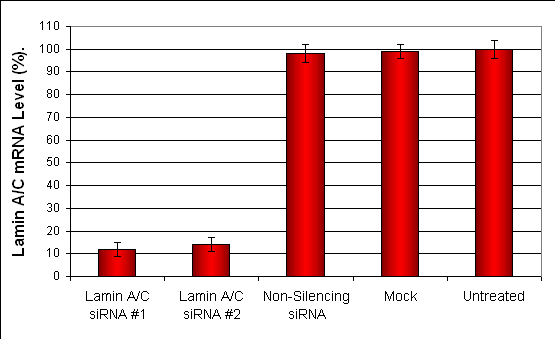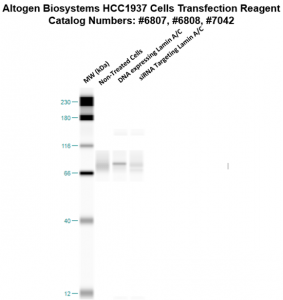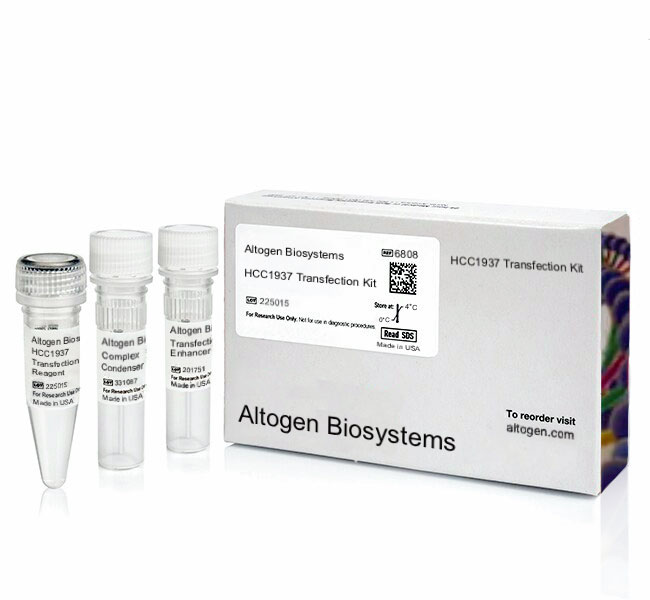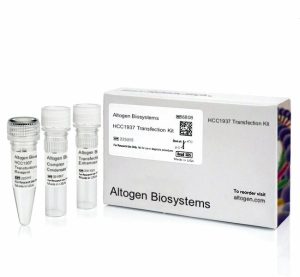Description
Purchase Orders: Click “Add to Cart” button to order, then email PO to orders@altogen.com.
Product Availability: In Stock.
Transfection Reagent for HCC1937 Cells (Breast Carcinoma Cells, CRL-2336)
- A biodegradable polymer based trasfection agent – once inside the cell, the polymer degrades into smaller less toxic components reducing cell toxicity, facilitating release of the transgene, and improving transfection efficiency
-
Optimized for intracellular delivery of plasmid DNA, siRNA, microRNA, and mRNA
-
High transfection efficiency of both siRNA and plasmid DNA without compromising cell viability
-
Achieve robust siRNA uptake for dependable gene silencing
-
Effective transfection under conditions of up to 40% serum
-
Transfection kit includes Transfection Enhancer and Complex Condenser reagents
-
Download in vitro HCC1937 transfection protocol: [PDF]
- Download HCC1937 CRISPR/Cas9 transfection protocol: [PDF]
- Download PowerPoint presentation for HCC1937 cells transfection kit: [PPT]
- UPC/GTIN/EAN: 860002089764
-
Brand: ALTOGEN®, developed and manufactured by Altogen Biosystems
Transfection Efficiency:
Reagent exhibits at least 84% transfection efficiency of siRNA delivery. Transfection efficiency was determined by qRT-PCR.
Product Description:
Enhanced transfection kit designed for superior efficiency in the HCC1937 cells, a human breast cancer cell line that has been extensively used in cancer research, particularly in studies related to breast cancer genetics and therapy. HCC1937 is a valuable model for studying triple-negative breast cancer (TNBC), a particularly aggressive and difficult-to-treat form of breast cancer.
Transfection Protocol and MSDS:
Download Altogen Biosystems HCC1937 Transfection Protocol: [PDF]
Download MSDS: [PDF]
HCC1937 Cell Line:
Breast cancer remains the second primary cause of cancer deaths in females worldwide, with more than 40,000 fatalities annually in the United States alone. However, breast cancer death rates in older women have been decreasing for the last decade primarily due to significant advances in breast cancer management and its early diagnosis, as stated by the American Cancer Society (ACS). Ductal carcinoma comprises about 80% of all breast cancer diagnoses. It begins in the milk ducts and spreads to surrounding breast tissue. Despite novel treatment options, breast cancer remains among the top causes of female deaths, globally. Research carried out using transfection can lead to revelations that could help devise combinatorial treatments to cure breast cancer. The HCC1937 cell line is derived initially from the mammary gland of a 23-year-old Caucasian female with breast carcinoma that is associated with genetic predisposition. HCC1937 was established from a primary ductal TNM Stage IIB, grade 3 carcinoma in 1996. This type of breast cancer is believed to have genetic links because in many cases multiple family members will be affected. This cell line could be useful for the study of different types of breast cancer. HCC1937’s modal chromosome number is 100. Each cell doesn’t possess a fully intact X or Y chromosome. Altogen Biosystems manufactures optimized polymer-based biodegradable transfection reagent kits. The reagent has exhibited high transfection efficiency for the HCC1937 breast carcinoma cell line.
HCC1937 is a human breast cancer cell line that was derived from a patient with hereditary breast cancer. HCC1937 cells have a mutation in the BRCA1 gene, which is a tumor suppressor gene that is commonly mutated in hereditary breast and ovarian cancers. HCC-1937 cells are characterized by their ability to form tumors when injected into immunodeficient mice and their sensitivity to DNA-damaging agents, such as ionizing radiation and chemotherapy drugs like cisplatin. They also exhibit many of the features of aggressive breast cancer cells, such as high proliferation rate, anchorage-independent growth, and invasion of surrounding tissues. HCC1937 cells are widely used in breast cancer research as a model system to study the molecular and genetic mechanisms underlying hereditary breast cancer, as well as to evaluate the efficacy and safety of potential therapeutic agents for breast cancer.
Mutations:
| TP53 | 7157 | 37 | 17 | 7577022 | 7577022 | Nonsense_Mutation | SNP | G | A |
| SNTG2 | 54221 | 37 | 2 | 1271265 | 1271265 | Silent | SNP | C | T |
| PCDH17 | 27253 | 37 | 13 | 58208476 | 58208476 | Missense_Mutation | SNP | G | A |
| CPA3 | 1359 | 37 | 3 | 148583291 | 148583291 | Nonsense_Mutation | SNP | G | T |
| CLCN1 | 1180 | 37 | 7 | 143039081 | 143039081 | Missense_Mutation | SNP | G | A |
| KPNA1 | 3836 | 37 | 3 | 122156057 | 122156057 | Missense_Mutation | SNP | G | A |
| ARC | 23237 | 37 | 8 | 143694621 | 143694621 | Missense_Mutation | SNP | G | A |
| PRDM16 | 63976 | 37 | 1 | 3328691 | 3328691 | Missense_Mutation | SNP | G | A |
| ESPN | 83715 | 37 | 1 | 6505861 | 6505861 | Missense_Mutation | SNP | C | T |
| CASP9 | 842 | 37 | 1 | 15821900 | 15821900 | Missense_Mutation | SNP | C | T |
| TMEM82 | 388595 | 37 | 1 | 16069370 | 16069370 | Silent | SNP | C | A |
| CROCC | 9696 | 37 | 1 | 17296814 | 17296814 | Missense_Mutation | SNP | C | T |
Data:

Figure 1. siRNAs targeting Lamin A/C mRNA or non-silencing control siRNA were transfected into HCC1937 cells following the recommended protocol. At 48 hours post-transfection the cells were analyzed by qRT-PCR for Lamin A/C gene expression levels. 18S rRNA levels were used to normalize the Lamin A/C data. Values are normalized to untreated sample. Data are means ± SD (n=4).

Figure 2. Protein expression of Lamin A/C in HCC1937 cells. DNA plasmid expressing Lamin A/C or siRNA targeting Lamin A/C were transfected into HCC1937 cells following Altogen Biosystems transfection protocol. At 72 hours post-transfection the cells were analyzed by Western Blot for protein expression levels (normalized by total protein, 10 µg of total protein loaded per each well). Untreated cells used as a negative control.
Altogen Biosystems manufacturers preoptimized transfection kits for cancer research. Reagents and transfection protocols are optimized for individual cancer cell lines. Altogen Biosystems developed two types of in vivo delivery kits for animal research: Tissue-targeted reagents (delivery into liver, pancreas, and kidney tissues), and in vivo biodistribution reagents (PEG-Liposome, Nanoparticle, Lipid, and Polymer-based kits). Optimized transfection protocols provide efficient intracellular delivery of proteins, DNA, and RNA molecules in vitro and in vivo. Read more about transfection technology at Altogen’s Transfection Resource. Altogen Labs provides good laboratory practice (GLP) compliant preclinical research services for IND applications and drug development. Our biology CRO services includes both efficacy studies (over 90 in-house validated xenograft models) and safety pharmacology/toxicology studies.
Volume Options:
- 0.5 ml (Catalog #6807)
- 1.5 ml (Catalog #6808)
- 1.5 ml CRISPR (Catalog #2145)
- 8.0 ml (Catalog #7042)
Purchase Orders: Click “Add to Cart” button to order, then email PO to orders@altogen.com.
Product Availability: In Stock.






